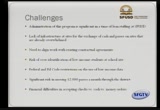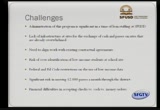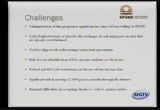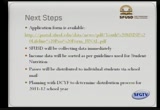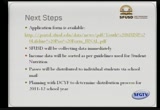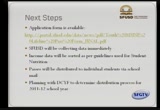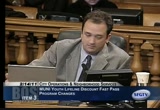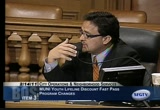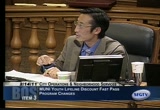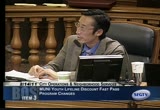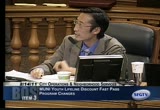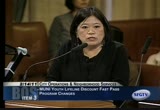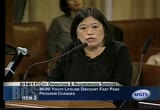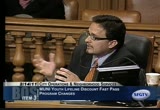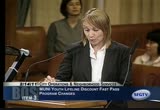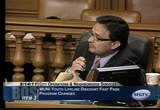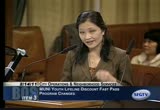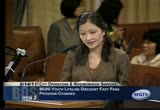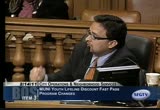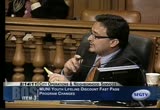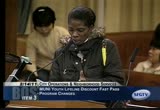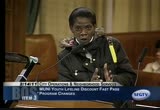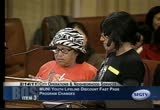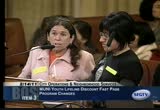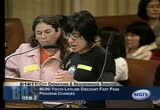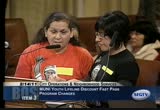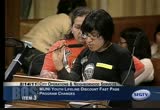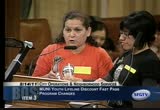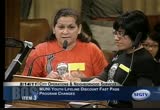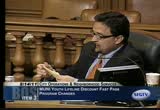tv [untitled] March 2, 2011 6:38am-7:08am PST
6:38 am
work with in this program. next issues include the risk of over identification of students at the school site. what i mean by this is that when we go to distribute these passes or go to sell these passes, rather, what you're talking about is doing this in a way so they you do not have, "these are the poor kids. these are the kids to when they are called down to go to a certain spot or certain site to pay for their passes" -- and let's be honest here. students at school find out what you're getting the past four, and that it is based on a certain income level, and that is what we're trying to avoid from an ethical standpoint and a legal standpoint. next item is that the use of the data for free and reduced lunch program is severely restricted. we are not in a position where we can simply take the data we have already in existence and transfer it over. the data, by federal law, is restricted to the use of free
6:39 am
and reduced lunch programs. we are not able to move that over. what we have to do is recreated in a way that can be set up so we can gather the same kind of data, but we have to do it in a separate new infrastructure. it is a redundancy. it is a bureaucratic mess, but it is what we have to do in order to follow the law and not risk funding for our free lunch program. the next two items on your i want to talk about is that with 12,000 passes, there is significant risk in being able to move that kind of money. we are talking about roughly the value of passes would be at $250,000. setting that up either at the sites or even at the central location requires an amount of risk. you are putting staff at risk. there are security issues. there is the ability for us to be able to accept that and be able to move it back all in a
6:40 am
way that is safe for our staff, save for the district, and keeps us financially viable so if there's any loss, we are able to secure it. the last issue here is around the -- and i know this is a huge issue for the youth commission and understandably so, and that is the issue of checks for cash or money orders. our desire was to make this as easy as possible. as i said before, dealing with cash, you are basically moving more than $100,000 in money and more than $250,000 in passes across the district. significant issues there. if we do this by check, we run the risk of if there is a bounced check, our understanding from our budget office is that costs the district $50 per bounced check. what we are at risk for is if we do this by check, the district is financially at risk for hundreds of thousands of dollars under the worst-case scenario. and then the last case, we could
6:41 am
be as strict as possible from the district can do this under money orders, but the problem with that as we have added on an additional fee to our students and we are very quickly defeating the whole purpose of this, which is to make this as inexpensive and easy as possible. that is a quick sampling of some of the challenges we found and why we found is not viable right now for us to do this as a district and be able to sell these passes. so we are very pleased, and i give the enormous credit, supervisor campos, to you and your staff for moving this forward as well as our partners with mta to bringing us what i believe will be a viable system. we are now moving forward with looking to not sell but rather distribute free passes to the most -- what we believe are the most deserving secondary level
6:42 am
students. what we have identified is that looking at our statistics, we have roughly 10,000 students between middle school and high- school will fall within the free lunch program. the other 2000 are covered with and our homeless and transitional age -- transitional youth. of those 10,000, we are said to be able to provide those for the month of april, may, and june, the rest of this fiscal year. we have developed the application form. it is now on our website. here is the address. i have also brought copies for distribution as a wealth. we will be sending out this e- mail to all the supervisors as well as our partners at the youth commission. we have identified the staffing requirements within our shop to be able to collect data immediately, so we are ready to receive this. the income data, while we cannot use the exact data we use for
6:43 am
free and reduced lunch program, we can use it basically in parallel to the way that the guidelines are set up, so the income data we receive, we will sort and be able to evaluate that using the same guidelines as set out by the federal government. the passes will be distributed to individual students the a school mail, and lastly, as supervisor campos pointed out, we are looking to set this up as a sale program for next year, but i am planning with the department of children, youth, and their families through their affiliates and be able to set it up there. that is where the program stands at this time. i'm happy to answer questions. supervisor elsbernd: just one question, chris. maybe it is not for you, but sometimes, there's a group of students that get lost in the cracks here. there are some students, and i
6:44 am
admit not a large amount, but there are some students who economically qualified to do not attend public school but attend parochial school and attend private school in san francisco. i did not expect the you have got an answer to this one, but i would appreciate hearing down the line -- not today, not asking for something off the top of your head, any thoughts you might have on how we go after that. i recognize it is a small group, but they are san franciscans, and they need this economic threshold, and they could use our help as well on what we could do collaborative with some of the parochial and private schools to help get to those kids. >> i think it is an excellent point. it is one that has been raised within the task force. it is what i do not have an answer for at this time, but working with the coalition of independent schools, working with the archdiocese, i believe we can find a way.
6:45 am
we have to recognize that unless there is an expansion of the program, working with that, we had to reduce our own allocation, so there is a number of issues to be worked out. supervisor campos: any other questions? what i would say to that, i think you raise an excellent point, and my hope is that eventually, we will get to a point where something can be done about those students as well. quite frankly, for me, division should be even beyond that. how do we, in a fiscally responsible way, get to a point where we could expand and make this available to as many youth as possible, independent of whether they are in public schools or not. i think this is a step, but i think it is important to remember that there are many students in san francisco in a private school system, and we need to make sure they are not left out. supervisor mar: thanks a lot to
6:46 am
the school district staff for explaining the difficulties of the risk but also the -- i think you call that the bureaucratic mess, to not implement this until the last three months of the year. it is very frustrating because the money was allocated, but i understand how complex it is, and i'm glad you're working with the mta and dcyf as well to make it happen. i wanted to clarify -- there's the 12,000 passes, and 2000 are for homeless and transitional youth. so the 10,000 remaining would be for anyone in middle school or high school or secondary school students, so that as middle or high school age -- is that right? >> that is correct. supervisor mar: and they have to sell identified as eligible for free and reduced lunch, but anybody who self identifies? >> yes. we have the application. i will be glad to give you a
6:47 am
copy of this before i leave. it is basically a self identification and an affidavit. very different form, but similar in structure to the way we administer the free and reduced lunch forms. supervisor supervisor mar: i know a lot of the youth in the district are limited english-speaking, so i hope there is the process to raise awareness in the communities of color that this be available. can you explain how a community outreach will be done? >> it has been put on our website. as i said before, we will send it out to all of our partners. one reason for the delay is because we wanted to get the cover letter translated into spanish and chinese. that is available there. the office to which this is directed -- we do not have a chinese speaker. we do have a translator in
6:48 am
spanish. we will do outreach using the monday reminders to our principal at the secondary level. we will figure out the best way to get this word out. supervisor mar: i know a number of the organizations that are here from communities of color can speak to this up for the last three months of the fiscal year. i support supervisor campos's vision that this free muni pass be available much more broadly beginning the next fiscal year. thank you. supervisor campos: before we turn it over to the mta, i see
6:49 am
commissioner fewer is in the audience. i do not know if you wanted to add anything to the presentation from the school district, but the main thing from this end of the aisle is simply making sure that the school district sees that all steps are taken to make sure this program is implemented as quickly as possible. welcome to the chamber, and welcome -- and thank you for being here. >> we passed a similar resolution supporting a resolution to have a youth lifeline pass for low-income students. i would like to also add another part of our resolution, our concern for our students and students of private schools. when the have turned 18 but still working on their high- school diplomas, we have had an issue with many of our students being issued tickets -- not just
6:50 am
one, but two tickets, amounting to $150. these are high school students. they have turned 18 before their graduation date. we feel the m.t.a. should grant them immunity -- i mean an exception. they should not have to buy an adult pass. they are full-time students. as you recognize in your resolution, we have a lot of low income students, including students who rely every day on writing muni to schools, work, and home. the board of education is working on a transportation plan that will eliminate a lot of our high school bus transportation. we would appreciate the board of supervisors looking into and asking mta if they might make exception for students who have
6:51 am
turned 18 but are still working on high-school diplomas. supervisor campos: if i may ask janet martinson of the mta -- of want to thank her and the entire mta staff for working so diligently in the last two months to try to make this happen. i also want to think the director and executive director for their efforts. >> thank you for bringing this resolution for us. i am janet martinson. i am mainly here to voice mta support for this resolution and to talk a little bit about the mta's actions.
6:52 am
the mta has been working collaboratively with supervisor campos's office and the school district to support implementing the youth level and program. in regards to the mta action moving forward, since the mta board did previously approved the allocation of 12,000 monthly passes per month to low-income youth at $10 per month, it will need additional approval by the mta board in order for the mta to be able to provide the same passes for free for the remainder of the fiscal year. we are planning to have that heard at the march 1 mta board meeting. that is all up i had to say. i am available to answer any questions. supervisor campos: i do want to thank you and the rest of the staff for moving so quickly to put this item on the agenda. this is something that has been
6:53 am
moving very quickly. we greatly appreciate that. it was not an easy thing to do. i would encourage you to continue to do what you have to do to work collaboratively with us and the other sister agencies and the community. thank you very much. >> thank you, supervisor. supervisor campos: if i may ask the director of the department of children, youth and their families -- thank you for being here. i also want to reiterate my thanks to the mayor for his interest in this and for moving so quickly to make sure that all of the city resources were made available to expedite the implementation of this. thank you and welcome to the committee. >> good afternoon, members of the committee. i fully support this resolution.
6:54 am
i am here to avail myself to work with mr. r metro -- armitraud, the youth commission, and ms. martison to develop a discounted past delivery system for next year that is going to be streamlined, sensitive to the needs of our youth and families , and something that is administratively sound and sustainable. winter -- we participated in this process closer to the end of this process, after many months of conversation between the school district, mta, and members of the board, primarily so we can call the school district develop a system for next school year that will meet the needs of our families.
6:55 am
we will make the commitment to work with our partners in developing the planning process and creating a delivery system that will work from all of us so that come august, when school starts again, we will be able to have, once again, a streamlined system. we actually do partner very closely with several institutions that are housed in said the school already, which i believe will help us facilitate the delivery of these fast passes, namely the wellness centers. we operate those in all of the public high schools. we have many after-school programs throughout the city in all of our schools. we also have family resource centers that we operate throughout the city. i think there will be lots of options for us to meet the
6:56 am
needs of the community. i look forward to working with our partners in doing this. supervisor campos: thank you come and director. if i may add, i think it was a great idea for the mayor to include the bcyf in the discussion. as part of your ongoing work, you have a -- established relationship with many people in the school district. i think working with the mta will help move this forward a lot more quickly. i think it is a great idea. thank you very much. that is it in terms of the presentation. i know we have a number of speakers who are here. with the chair's commission -- permission, we will move to public comment. i know it is valentine's day. we appreciate the comments, but i know people want to get home at some point to their loved ones. so two minutes per speaker.
6:57 am
if i call your name, please come up. i apologize if i mispronounce any names. maria gonzales, frank lara, olsen martinez, carmen lee, norah calderon, jonah abernathy. if you can please come forward and speak, you each have two minutes. thank you. >> good afternoon, a supervisor. my name is joanne and i am a member of power. i want to make a quick comment. i would like to see the comments come first for the experts come and speak. sometimes, we do not get our answers from the experts. we take our comments and leave, but we do not get there in point
6:58 am
-- that their input on what we commented on. i have three kids and one adult child. i have a budget of $980 a month. i spend $450 on rent. i spend a $200 on fast passes to get on unique a month. -- get on muni a month. this is for a family of four. the would like free passes. it would stop the children from getting on the back door to try to get their education. also, i would like to see it because 80% of my neighborhood does not know anything about what is going on down here. i would like to see some of the outreach go into my neighborhood so they would know what is going on about these test passes. i did hear one of the supervisors mention a unified
6:59 am
school district. one of my daughters goes to a charter school, and they do not give this kind of information. i would like to see it go into the tractor schools. more parents are putting their kids into charter schools. my other comment is that i agree that the passes should all look the same. i do not think they should make low-income versions of the passes. the reason for that is because a lot of kids can be cruel. like they said, you can put somebody into a low-income category and put somebody in to a higher category. [applause] supervisor campos: thank you very much. next speaker, please. >> [speaking spanish]
7:00 am
7:01 am
7:02 am
>> good afternoon. my name is theresa molina. i am a member of power. i have five beautiful children and two grandchildren. sometimes, i do not have a lot of work. i want to ask you support the implementation of the money so we can have these best passes, which are definitely needed. sometimes i have to choose between getting a fast pass or buying food. i do not think it is fair my children would have to miss school because the cannot afford a fast pass. thank you very much, and happy valentine's day. supervisor campos: gracias. siente, por favor. gracias.
7:03 am
>> [speaking spanish] >> i am norah calderon, and i am a member of power. i am the mother of a high-school student right now. today is february 14, and it is very difficult for me. i have not been able to buy a fast pass for my son for this month. the reason i have not been able to afford a fast pass is i live in public housing and have an older son who works. my rent right now is almost $1,300 a month.
7:04 am
when not to ask that you pass these free fast passes. we are tired of empty promises. it is really important that our actions speak louder than promises. i think it is important that we think about the students that are not just in public schools, but private schools. a lot of them are low income. they have gotten scholarships to attend these schools.
7:05 am
7:06 am
our use of getting punished. police are ticketing them. they are causing students to miss school. they are ticket and parents. there is not that consciousness about what is making it so people cannot pay, so that students miss school, and what we can do to prevent these things from happening and to support low-income families.
7:07 am
it is really important that the word spread in different neighborhoods and low-income communities that we need at 10,000 to 12,000 fast passes. people are not able to get to school if the cannot eat and do not even have breakfast. i think the city has a lot of money. we need to make sure these are implemented. supervisor campos: next speaker. i am going to read a few more names. pilar gonzales, who i think already spoke, emily lee, and others. >> if you do not mind, we have a presentation on behalf of more public transit the we are going to give.
86 Views
IN COLLECTIONS
SFGTV: San Francisco Government Television Television Archive
Television Archive  Television Archive News Search Service
Television Archive News Search Service 
Uploaded by TV Archive on

 Live Music Archive
Live Music Archive Librivox Free Audio
Librivox Free Audio Metropolitan Museum
Metropolitan Museum Cleveland Museum of Art
Cleveland Museum of Art Internet Arcade
Internet Arcade Console Living Room
Console Living Room Books to Borrow
Books to Borrow Open Library
Open Library TV News
TV News Understanding 9/11
Understanding 9/11